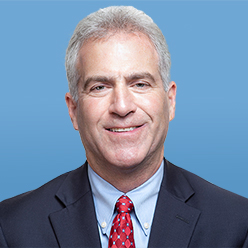Ukraine’s presidential election, in which a popular comedian with no political experience is projected to beat a seasoned incumbent with considerable baggage, reflects global trends that continue to shake the global order.
Across the world, economic stagnation, immigration, and other challenges are fueling disgust with traditional politics, leaving voters increasingly attracted to candidates who offer a fresh face and a new approach — even if (or especially if) the candidates are novices and their agendas are vague.
The question is whether, over time, novice leaders (whether in the United States, Ukraine, or elsewhere) adapt to the post-war arrangements that have served the world well for three-quarters of a century, or those arrangements fall victim to unorthodox approaches that new leaders promise and voters seem increasingly willing to try.
That’s a timely question as freedom and democracy are declining around the world, Washington is cooling toward its Western allies and eschewing multilateral trade opportunities, Beijing is promoting an authoritarian alternative to U.S.-led freedom, China and Russia are working more closely in an anti-U.S. axis, and nuclear weaponry threatens to proliferate and further destabilize the world.
On April 21, Ukraine’s Volodymyr Zelensky, a comedian who pretends to be President in a Ukrainian TV show, squares off against the actual incumbent President, Petro Poroshenko, who has served since 2014. In their battle, Zelensky and Poroshenko symbolize the unsettling global politics of our time.
First, it’s a battle between old and new.
Zelensky is what the ancient philosophers called a “Tabula Rasa” (a blank slate), for he has offered few ideas about what he would propose or whether he can work the mechanics of a parliamentary government.
The same forces that may catapult him to victory, however, offer him a huge opportunity. Only 9 percent of Ukrainians express confidence in their government, which is the world’s lowest level for a second straight year, so the bar that he must clear to satisfy public thirst may be a modest one. To succeed, Zelensky would need an effective reform agenda that increases public confidence by reducing corruption, nourishing transparency, and addressing the country’s serious economic problems.
Poroshenko is as experienced as Zelensky is green. An oligarch known as the “Chocolate King” for his great financial success in confectionaries, he was first elected to Parliament more than 20 years ago. He served in the governments of Presidents Leonid Kuchma, Viktor Yushchenko, and Viktor Yanukovych and helped establish different political parties between stints as a Parliamentarian.
He won the Presidency in 2014 and, since then, has fought Russian-backed forces on the battlefield, sought a diplomatic solution to the conflict, and reoriented Ukraine away from Russia and towards the West.
Now, however, living standards in Ukraine are falling, and despite Poroshenko’s promise to sell his business upon taking office, the “Panama Papers” revealed that he merely moved its assets elsewhere.
The same public disgust with economic stagnation, population migration, and unresponsive government that’s boosting novice candidates all over the world could well catapult another one to the top spot in Kiev — especially one running against an incumbent who has profited so much from the status quo.
Second, it’s a battle between stability and a roll of the dice.
Even when fed-up populations aren’t changing leaders, they’re forcing radical change through other means in even the most traditional of countries, perhaps without fully appreciating the consequences.
That, apparently, is what’s happened in Britain, where voters opted for a “Brexit” from the European Union in a 2016 public referendum but where Prime Minister Theresa May still can’t gather the votes in Parliament around a plan to leave the EU without sending Britain’s economy into a tailspin.
Whether, in Ukraine, a projected new President will find less disruptive means to address economic concerns is anyone’s guess.
Third, it’s a battle between hope and fear.
That, in unsettled times, fear is an effective campaign tool is hardly breaking news. Donald Trump rode fears of lost jobs and falling wages due to immigration to victory, and Benjamin Netanyahu has long retained office by stoking Israeli security fears were his opponents ever to win.
Well behind in the polls, Poroshenko is stoking fears about what Zelensky could mean for his besieged country. With Ukraine at war with Russia-controlled proxies, he’s calling for “a total mobilization of all Ukrainian patriots,” denouncing such adversaries as “pseudo-patriots” and “open agents of the Kremlin,” and warning that Zelensky will push Ukraine toward Russia and away from the West.
To be clear, change is often necessary. The post-war global order was, in fact, a dramatic change itself when the U.S.-led West began laying the groundwork for it while the Allies were still fighting the Axis powers.
For Ukraine, the question is whether a projected new leader can reassure a potentially skeptical West by taking reasoned and effective steps to address corruption, raise living standards, and keep Russia at bay.
Lawrence J. Haas, senior fellow at the American Foreign Policy Council, is the author of, most recently, "Harry and Arthur: Truman, Vandenberg, and the Partnership That Created the Free World".
